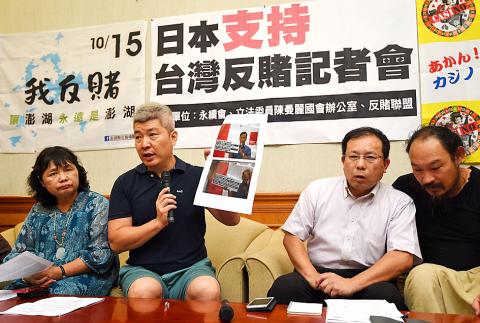Allowing casino development in Penghu County would overload the environment while crowding out sustainable tourism, opponents of a county gambling legalization referendum said yesterday, as they voiced concern that next week’s referendum on the issue might pass.
Shouting slogans in opposition to casino development on “beautiful Penghu,” dozens of opponents from “mainland” Taiwanese environmental groups gathered for a Legislative Yuan news conference, which highlighted casino developments’ potential ecological damage to the county.
“To build something as large as a casino within such a small space and then attract such a huge number of people will necessarily affect the neighboring ecology,” Society of Wilderness executive director Liu Yueh-mei (劉月梅) said.

Photo: Chien Jung-fong, Taipei Times
“Because Penghu’s population is small, its demand for water — along with the amount of trash and wastewater which must be disposed — have all been extremely small, and the extra water and garbage from the casinos would not be something that we would be able to take care of on our own,” said Hung Yi-mei (洪一梅), who grew up in Penghu and now serves as a board member of the Sea Citizens Foundation (海洋公民基金會), a non-governmental organization in Penghu with roots in a successful campaign to halt an earlier 2009 gambling legalization referendum.
The nation is already struggling to come up with alternative methods of waste disposal as Kaohsiung cuts back on providing waste disposal for other counties, Hung said, adding that Penghu has no waste treatment facilities of its own.
She also called casinos a “cancer” which would crowd out ecologically sustainable tourism.
“Even though they say that casinos would develop tourism by sucking in huge crowds, the reality is that most spending would be confined to the casinos, along with their internal restaurants and hotels. Not only will patrons be unlikely to frequent local business, but local firms’ survival space could be negatively affected,” she said.
She also accused the administration of Penghu’s Democratic Progressive Party (DPP) County Commissioner Chen Kuang-fu (陳光復) of bias in not inviting opponents to county-sponsored “explanatory sessions” on the referendum.
Opponents also expressed concern about whether they could prevail.
“This time proponents have spent seven years preparing,” said DPP Legislator Chen Man-li (陳曼麗), a former Green Party activist who participated in the campaign to block the 2009 referendum.
She cited proponents’ recruitment of numerous prominent retired teachers and government officials to advocate for legalization, while using promises of high “feedback money” for residents as a key selling point.
If the referendum passes, further action will be required by the Legislative Yuan before any casinos can be constructed, with no legislative framework currently in place for casino approval and registration.

Alain Robert, known as the "French Spider-Man," praised Alex Honnold as exceptionally well-prepared after the US climber completed a free solo ascent of Taipei 101 yesterday. Robert said Honnold's ascent of the 508m-tall skyscraper in just more than one-and-a-half hours without using safety ropes or equipment was a remarkable achievement. "This is my life," he said in an interview conducted in French, adding that he liked the feeling of being "on the edge of danger." The 63-year-old Frenchman climbed Taipei 101 using ropes in December 2004, taking about four hours to reach the top. On a one-to-10 scale of difficulty, Robert said Taipei 101

A preclearance service to facilitate entry for people traveling to select airports in Japan would be available from Thursday next week to Feb. 25 at Taiwan Taoyuan International Airport, Taoyuan International Airport Corp (TIAC) said on Tuesday. The service was first made available to Taiwanese travelers throughout the winter vacation of 2024 and during the Lunar New Year holiday. In addition to flights to the Japanese cities of Hakodate, Asahikawa, Akita, Sendai, Niigata, Okayama, Takamatsu, Kumamoto and Kagoshima, the service would be available to travelers to Kobe and Oita. The service can be accessed by passengers of 15 flight routes operated by

Taiwanese and US defense groups are collaborating to introduce deployable, semi-autonomous manufacturing systems for drones and components in a boost to the nation’s supply chain resilience. Taiwan’s G-Tech Optroelectronics Corp subsidiary GTOC and the US’ Aerkomm Inc on Friday announced an agreement with fellow US-based Firestorm Lab to adopt the latter’s xCell, a technology featuring 3D printers fitted in 6.1m container units. The systems enable aerial platforms and parts to be produced in high volumes from dispersed nodes capable of rapid redeployment, to minimize the risk of enemy strikes and to meet field requirements, they said. Firestorm chief technology officer Ian Muceus said

MORE FALL: An investigation into one of Xi’s key cronies, part of a broader ‘anti-corruption’ drive, indicates that he might have a deep distrust in the military, an expert said China’s latest military purge underscores systemic risks in its shift from collective leadership to sole rule under Chinese President Xi Jinping (習近平), and could disrupt its chain of command and military capabilities, a national security official said yesterday. If decisionmaking within the Chinese Communist Party has become “irrational” under one-man rule, the Taiwan Strait and the regional situation must be approached with extreme caution, given unforeseen risks, they added. The anonymous official made the remarks as China’s Central Military Commission Vice Chairman Zhang Youxia (張又俠) and Joint Staff Department Chief of Staff Liu Zhenli (劉振立) were reportedly being investigated for suspected “serious